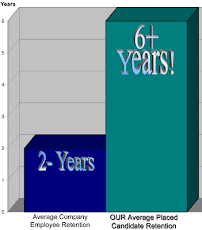The answer may be simpler than one would expect: humans don’t like doing things that they are not great at, especially if there are grave consequences when executed poorly.
Hiring can make or break any business. This is especially true with small and medium-sized businesses. In general, most people are not very good at hiring employees. In fact, according to hiring expert Charles Handler, Ph.D.: on average, 45% of new hires leave in the first 6 months and 15% of new hires are fired within the first year. And if you thought that was bad, the harm that hiring mistakes can do to your business is much worse: wasted time, reduced morale, lost clients ... I could go on. In fact, employee turnover costs range from 1/2 to 5 times an employee's annual wages.*
How did hiring, as we know it, become so broken? Many experts believe it’s because hiring has become more of an administrative task than a strategic or managerial priority; a painful task that’s frequently delegated to an administrator, or a recruiter. Business leaders must become more invested in hiring, so they can avoid spending far more of their time and resources managing and firing. Here are some helpful tactics:
1) Focus On What’s Important:
Only you know what it is you are looking for, so make sure to prepare before you start hiring. One key thing to note is that it’s just as crucial to understand what isn’t important, as what is. Avoid becoming romanced by qualifications that are not relevant to getting the job done. Make sure you also have a good understanding of what sort of personality you’re seeking, because, as the old saying goes: you can train skills, but you can’t train fit.
2) Hiring Is Sales:
Often, the best candidates are not looking for a job, so they must be sold on your opportunity. From HubSpot, Paul English, founder and CTO of Kayak, the most popular travel search site on the web:
“When someone mentions the name of a person that they’ve worked with that they think is exceptional, a little clock starts ticking in my head. From when the clock starts, I give myself seven days to track them down, back channel, get them in for two series of interviews that are intense and focused, and make an offer and have them accept it.”
3) Become Good At Asking Questions and
Typically, even when employers do a good job of getting the right candidates to the table, they don’t prepare adequately for the interview. The interview is critical for avoiding a bad hire and ensuring you’ve got the right person. You can forget about trying to “fix” unfit employees after you hire them, because this is either impossible or a huge waste of time, no matter how strong a manager you are.
Avoid asking a standard set of questions. Instead, ask questions based on your candidate’s own strengths and weaknesses, compared to what’s required to successfully perform your unique job. Try to focus on areas where they appear to be weaker than others, or where their performance might derail while they are working for you. Make sure you keep digging when you ask your questions (ask “why” a lot), as this is your opportunity to really get to know this person before committing to them. You have to feel comfortable that you can live with all of your candidate’s weaknesses and that they won’t become obstacles that get the way of their success.
I’ve learned a great way to get some really honest responses is through difficult questions such as: “Who was your last boss? What will they tell me about your strengths and weaknesses when I call them this afternoon?” Another tactic is meeting with your candidate in a social setting (go for a drink with others, if you can) where they are more likely to be themselves.
Let me know how these tactics work for you and don’t be afraid to email be with any questions!
_______________________________________
*Charles A. Handler, Ph.D. (2009) Using Technology to Support Informed Decision Making Within the Hiring Process.














No comments:
Post a Comment